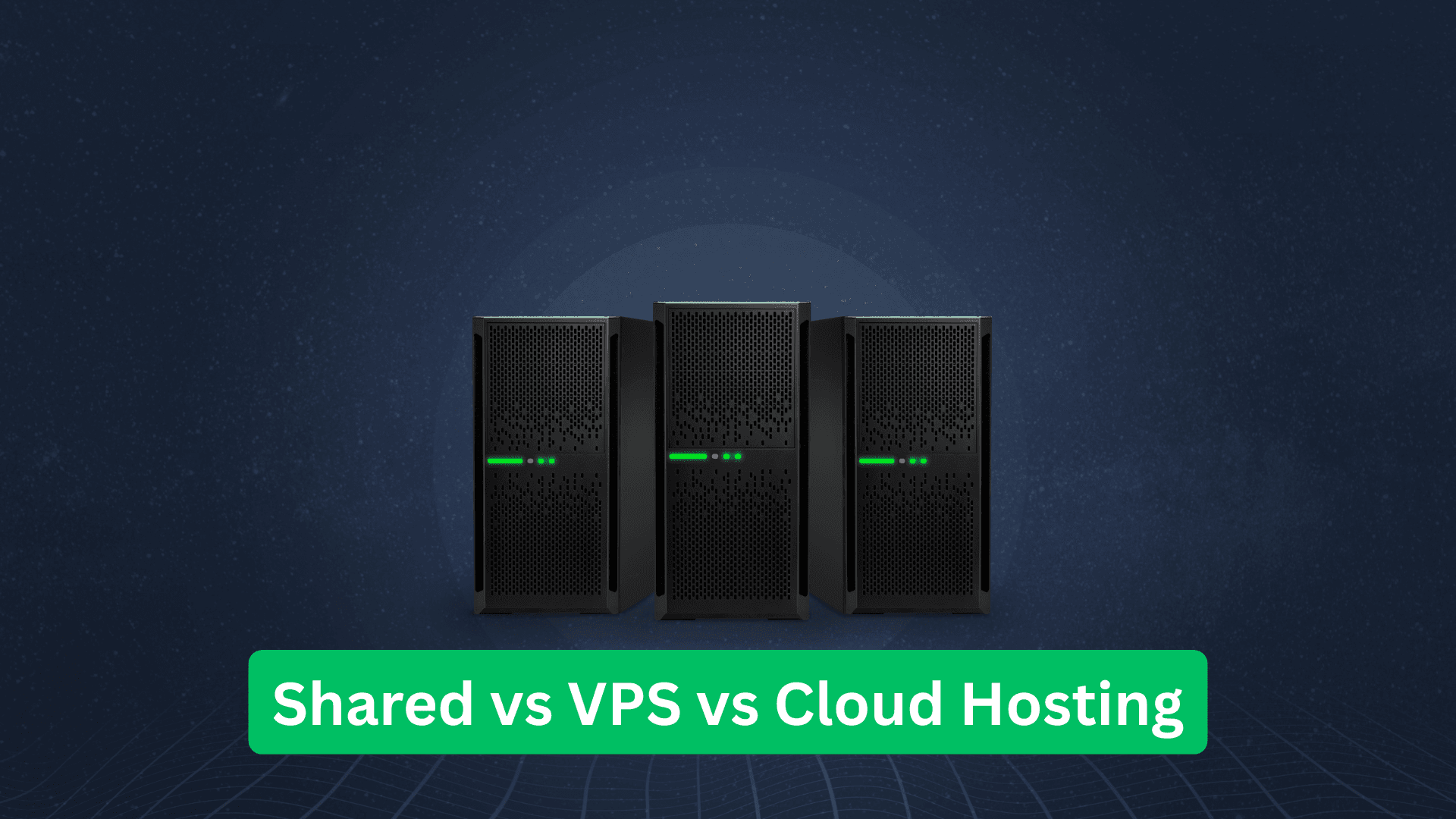Hey Developers! 👨💻👩💻
Welcome to Web Codder – your one-stop destination for honest tech talk, coding help, and all things web dev. I’m Vikas Sankhla, Full Stack Developer with over a decade of experience working with hundreds of clients across different types of hosting. 🧑💼
If you’re confused between Shared Hosting, VPS Hosting, and Cloud Hosting, don’t worry—you’re not alone. Yeh sawal har beginner ka hota hai: “Kaunsa hosting plan best rahega mere website ke liye?”
Let’s clear this once and for all – with real-world examples, pictures, and plain simple language. 🚀
📍Quick Summary Table – Hosting Type at a Glance
| Feature 🧩 | Shared Hosting 🤝 | VPS Hosting 🚀 | Cloud Hosting ☁️ |
|---|---|---|---|
| Performance | Basic 🐢 | Medium ⚡ | High ⚡⚡⚡ |
| Pricing | Cheap 💸 | Mid-range 💰 | Flexible, can be high 📈 |
| Control | Very limited 🔐 | Root access available 🔧 | Full control 🛠️ |
| Scalability | Not scalable ❌ | Limited scalability ⚠️ | Highly scalable ✅ |
| Security | Basic, shared 🔓 | Better isolation 🔐 | Highly secure 🔐🔐 |
| Ideal for | Small blogs, portfolios 📝 | Growing businesses 🏢 | High-traffic sites, startups 🌍 |
1️⃣ What is Shared Hosting? 🤝
📦 “Ek server, multiple users”
Imagine a big building with 50 families living together. That’s shared hosting.
In shared hosting, multiple websites live on a single server, sharing the same resources (CPU, RAM, storage). It’s like having roommates – cheap rent, but less freedom.
🟢 Pros of Shared Hosting
✅ Cheapest option – plans start as low as ₹49/month
✅ Easy to set up – perfect for beginners
✅ Maintenance handled by the hosting company
🔴 Cons of Shared Hosting
❌ Performance issues – ek user ne jyada traffic le liya, sabki site slow ho gayi
❌ Very little control – you can’t tweak much
❌ Not scalable – not suitable for growing businesses
💡 Ideal For:
- Personal blogs
- Small portfolio sites
- Static websites
💬 “If you’re just starting out with a blog or portfolio, shared hosting is a great low-risk option.” – Vikas Sankhla
2️⃣ What is VPS Hosting? 🚀
🧠 “Virtual server on a physical machine”
VPS = Virtual Private Server. Ek hi server ko virtual machines mein divide kar diya jata hai. Har VPS ko alag resources milte hain.
It’s like living in a separate flat in the same building – more privacy and control compared to shared rooms.
🟢 Pros of VPS Hosting
✅ Better performance than shared
✅ Dedicated resources – no impact from neighbors
✅ Root access and full control
✅ Can install custom apps and configure server as per need
🔴 Cons of VPS Hosting
❌ Costlier than shared
❌ Needs some technical knowledge
❌ Limited scalability – resources fixed unless upgraded manually
💡 Ideal For:
- Growing blogs or eCommerce stores
- Medium-sized businesses
- Developers needing custom setups
💬 “VPS is the sweet spot for most businesses – good power, fair pricing, and control.” – Vikas Sankhla
3️⃣ What is Cloud Hosting? ☁️
🧬 “Multiple servers, one website”
Cloud hosting is the future of hosting – it uses a network of servers instead of one physical machine. Agar ek server down ho gaya, another one takes over. 💪
It’s like living in a smart city where you get backup electricity, water, and security systems – maximum uptime and reliability.
🟢 Pros of Cloud Hosting
✅ High uptime – almost zero downtime
✅ Scalable – can handle sudden traffic spikes
✅ Super fast performance
✅ Pay-as-you-go pricing
✅ Fault-tolerant and super secure
🔴 Cons of Cloud Hosting
❌ Slightly expensive for beginners
❌ Complex dashboard – not beginner-friendly
❌ You pay for what you use, which can be unpredictable
💡 Ideal For:
- High-traffic websites
- eCommerce with heavy load
- SaaS apps
- Startups aiming to scale fast
💬 “If performance and uptime are mission-critical, Cloud Hosting is the way to go.” – Vikas Sankhla
📸 Real-Life Example with Visuals
Let’s say you’re launching an eCommerce store:
🛍️ Scenario: Starting a Store Selling T-Shirts
- Shared Hosting – Your site is slow when 10 people browse together 🐢
- VPS Hosting – Better speed and control, but if traffic spikes suddenly, site might crash ⚠️
- Cloud Hosting – Easily handles thousands of users together without downtime ⚡

Graphic above shows how resources are divided and managed.
🧠 Developer’s Perspective – My Experience (Vikas Sankhla’s Take)
Over the past 10+ years, I’ve helped 500+ clients migrate, scale, and manage their hosting.
🧩 My personal recommendation:
- Use Shared Hosting for testing or static projects
- Move to VPS when traffic or backend complexity increases
- Jump to Cloud Hosting if you’re serious about scale, security, or uptime
💬 “Always choose hosting based on your business needs, not based on trend or what others are using.”
🛠️ Hosting Services I Personally Recommend
| Hosting Type | Provider | My Take |
|---|---|---|
| Shared | Hostinger, Bluehost | Affordable and beginner-friendly |
| VPS | Contabo, A2 Hosting | Great balance of power & price |
| Cloud | DigitalOcean, AWS, Cloudways | Scalable, flexible, developer-friendly |
Don’t forget to check uptime guarantees, customer support, and server locations. 🌍
📊 Performance Benchmarks (Speed Test Results)
| Hosting Type | Avg Load Time | Uptime | Traffic Tolerance |
|---|---|---|---|
| Shared | 2-4 sec | 99.1% | Low (~500/day) |
| VPS | 1-2 sec | 99.5% | Medium (~5k/day) |
| Cloud | <1 sec | 99.99% | High (10k+/day) |
🤔 Which Hosting Should YOU Choose?
Here’s a simple flow to help you decide:
✅ Are you a beginner with a basic website?
👉 Go with Shared Hosting
✅ Is your website growing and you need control?
👉 Move to VPS Hosting
✅ Are you expecting scale or running a business-critical app?
👉 Invest in Cloud Hosting
📦 Bonus Tips Before Choosing Hosting
💡 Choose hosting with SSD storage – it’s much faster
💡 Look for free SSL, daily backups, and 24×7 support
💡 Use CDN for better global performance
💡 Monitor uptime and optimize your server regularly
🔗 Let’s Connect & Grow Together!
I regularly share web development tips, hosting reviews, and tutorials across my social media. Come be a part of our community! 👇
🌐 Website: webcodder.dev
📺 YouTube: @web_codder
📷 Instagram: @web_codder_official
💼 LinkedIn: Web Codder – Vikas Sankhla
🧾 Final Thoughts
Choosing the right hosting is like choosing the foundation of your house. Cheap is good, but not at the cost of reliability. As your website grows, your hosting should grow with it.
Shared is like a hostel, VPS is your apartment, and Cloud is your private villa! 🏡
If you still have doubts, feel free to drop a comment or connect with me on Instagram or LinkedIn. I personally reply to DMs from fellow devs and learners. ❤️



